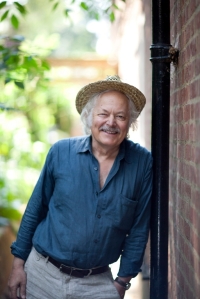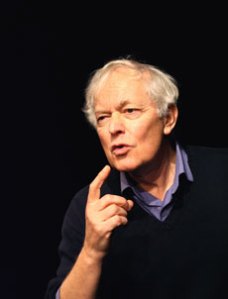
Michael Pennington (photo Helen Maybanks)
Renowned actor and author Michael Pennington introduces his new book on Shakespeare, Sweet William, based on his solo show of the same name. Read on, and you’ll find an exclusive extract from the book, that may whet your appetite for more…
This morning the snow is six inches deep and as I live at the top of a hill there’s not much prospect of going anywhere safely. The light bouncing off it into the house is a brilliant blue, and the sound is travelling differently – voices sound distant even when they are close at hand. The street is of course very still, in a kind of shocked silence.
Well, I try. But I’m not Shakespeare. And what I’m wondering this morning is what he would have made of this wintry scene. You may be able to think of some, but I can’t recall many snow scenes in Shakespeare, much as he liked autumn and seeing its empty branches as ‘bare ruined choirs where late the sweet birds sang’. Quite a bit of my new book has to do with what Shakespeare would have said about many things that exercise us today – the Arab Spring, the London riots, but also the World Cup (where our disgraced goalie in 2010 had the same name as the jealous playwright who denounced Shakespeare as an upstart crow when he first arrived in London). And as the creator of the immortal dog Crab in Two Gentlemen of Verona, think how he’d have liked the dog Uggie in The Artist…
This book, which has its origins both in my solo show Sweet William and in my first thrilling encounter with him when I was eleven, when I was blown away by the language of Richard II as spoken by the late lamented John Neville, is my fourth on Shakespeare and I thought that would be enough. But the trouble with Shakespeare is you can’t sign off : after 20,000 hours in his company I’m still getting big surprises. No sooner do I deliver this book than I see Ralph Fiennes’s brilliant film of Coriolanus and want to redo the chapter on that play – not rewrite it altogether, but I’d like to bring it up to date. Any good new production or film advances our understanding and changes our minds a bit. I’m hoping this book, like others I’ve done, will appeal to a wide variety – practitioners, Shakespeare fans, general readers. The pleasure has been that they also seem to appeal to academics, a community that I salute for the huge steps they’ve taken towards us in the trade during my working life. For fun, there are even imaginary conversations using only words and phrases invented by Shakespeare, and a conversation between Pistol from Henry IV and Parolles from All’s Well.
I’m also glad it’s coming out now, slightly beating the rush in a year when Shakespeare is going to be turned on like a tap : politicians will make startling claims, and there will be many misquotes while the nation congratulates itself on having produced such an amazing man. But really it’s he who’s produced us – with Chaucer, he more or less invented the language we use every day and he anticipated just about every political dilemma we’ve found ourselves in. I’d have bones to pick with him if I met him – the endless double meanings, the dreary Act Fours, his tendency to say the same thing three different ways – but that just shows how personal, almost intimate, one’s relationship with him is. He is the poet for your inner ear as well as the amphitheatre, for the middle of the night as much as for high noon. I hope you enjoy my version of him.

Michael Pennington performing his show 'Sweet William'
Dogs were no strangers to the Elizabethan stage. It’s thought that the jig that followed all performances of Shakespeare’s plays (even King Lear) may sometimes have featured a troupe of dancing dogs. But had anyone made such a feature of one as Shakespeare did with Crab in Two Gentlemen of Verona? I doubt it. Shakespeare is starting something here which certainly had consequences: in The Witch of Edmonton (1621, Dekker, Rowley and Ford) the Devil turns up disguised as a dog.
Crab conforms to an important technique of vaudeville: precondition the audience and they will laugh at anything. I recently saw a very brilliant French mime who ventured to do impersonations of various types of cheese. There, you’re interested already. He gave his Camembert a sort of shamefaced self-loathing, low and squat, as if his pungency embarrassed him; the English cheddar was rather upright and noble. From then on the mime could do no wrong. Yes, we cried, that’s a Bresse Bleu exactly; oh yes of course, a Taleggio, I’ve always thought that. Crab works like that too: to the relief of subsequent casting directors, Launce’s part is written in such a way that whatever Crab does, and is, is funny. Accused of ingratitude, whether he just sits there morosely, scratches and sniffs, bounds about, looks at the audience or blankly at Launce, it is equally good.
Shakespeare is of course well ahead of his time in this. A couple of centuries later Crab would have flourished in music hall as a speciality act – the Mind-Reading Dog or the Talking Dog; and he is perhaps a less manageable cousin of the ventriloquist’s dummy, that other means of putting words into an uncomprehending mouth. Indeed the comedy of the vent lies in the cussed independence of the dummy, which may relapse into the same stubborn silences as Crab. And of course a real dog on the stage exemplifies the immemorial mournful warning of W.C. Fields never to work with anything on four legs. Though biddable for small tasks, a dog is not much of a dissembler; and a theatre holds as many interesting distractions as a toy shop does for a child. In a recent production at the Open Air Theatre in London’s Regent’s Park, the fact that a barbecue was cooking throughout the evening in the foyer bar led to some interesting chases for Crab – off down the grassy slope at the front of the stage and right up the central aisle to the front of house, pursued by Launce and sometimes members of the audience. The Rose, if that is where the first Two Gentlemen played, can hardly have been less attractive, with its rich mélange of aromatic refreshments – cheese, spice, meat pies and roasted thrushes.
Sweet William is published by Nick Hern Books (January 2012). For a limited period only, copies can be purchased for just £16 (RRP £20) through NHB’s website (standard postal fees apply) here.

Thanks a lot for this marvellous book. I’m still enjoying it a lot. Special thanks for sharing some insights on Cymbeline, still my favourite!